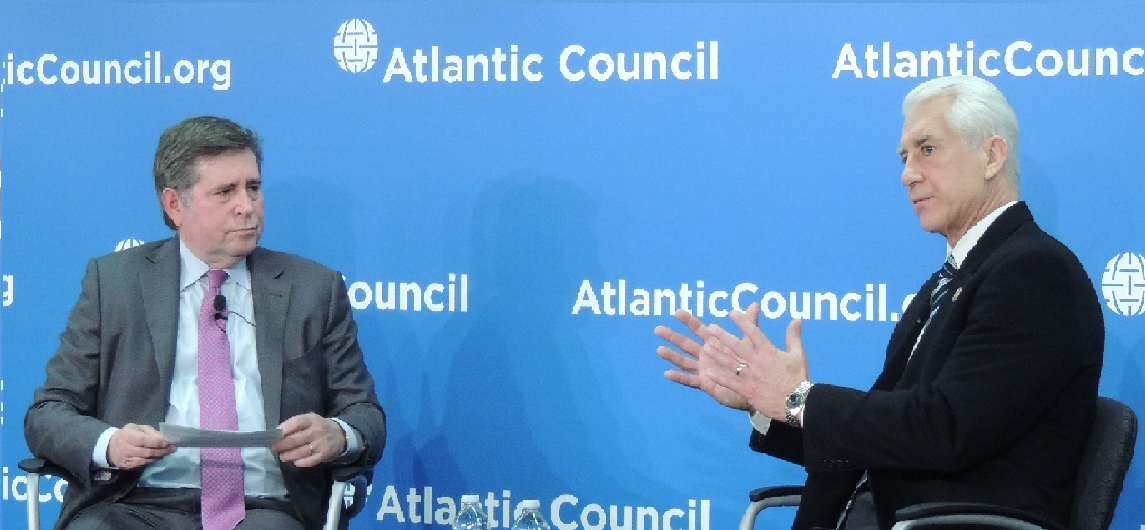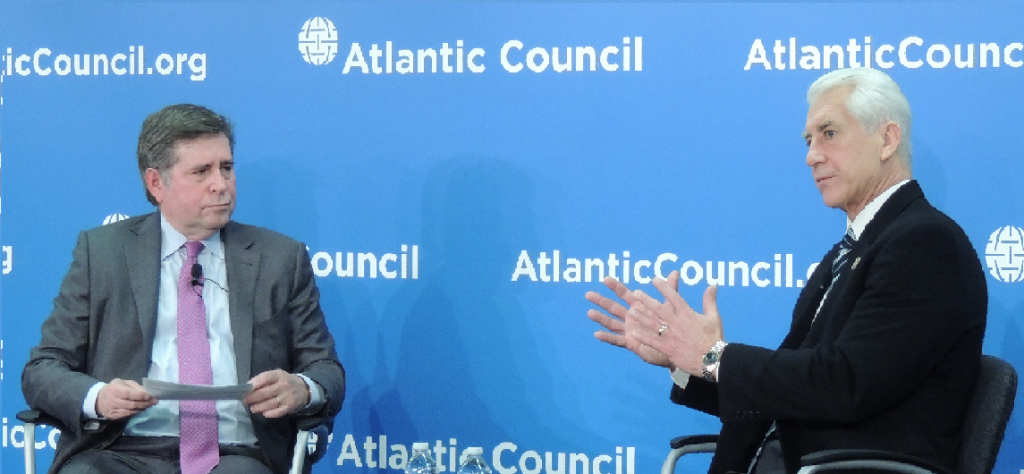
Leaders Make the Case for Trade at the Atlantic Council
Thanks to Congressman Dave Reichert for kicking off our excellent event on the 2015 Trade Agenda and the Trans-Pacific Partnership this morning!
You can find out more about our event and watch video highlights here.
Speeches & Official Announcements
TTIP: How Europe Can Deliver, by Cecilia Malmström
“It’s essential to keep the arteries of trade open and European firms happen to be very good at it. We believe they should be allowed to sell their services in the US. ” – Cecilia Malmström
At the Forum of Europe’s 2nd Annual EU-US Trade Conference, EU Trade Commissioner Cecilia Malmström underlined how the 8th round of TTIP negotiations were directly aimed at helping Europeans address the issues that most concern them, namely: sustainable economic prosperity, effective government, and a powerful and coherent voice for Europe in the world. Malmström stated that the kind of TTIP deal she wanted to see would make regulations more compatible, without lowering health, safety, environment or consumer protection standards. (European Commission)
Chairman Ryan Remarks: The Rule of Law and the Global Economy
“ For TTIP, the European Union must eliminate all tariffs – every one of them – just as they promised at the outset. And they must go further. They must address those unjustified regulations. Labels are labels – they’re meant to inform, not frighten. And regulations are meant to keep people safe, not to keep politicians in office. The way I see it, this is their opportunity to set up a system that’s transparent, coherent, and first-rate.” – Committee on Ways and Means Chairman Paul Ryan
Chairman Paul Ryan presented his vision for expanded US trade at the Washington International Trade Association today. His aim was to secure Congressional support for TPP, TTIP, and TiSA, summing up his approach to “Aim high. Go for the gold.” However, Chairman Ryan noted that the most important thing to do was to pass TPA, in order to give more power to Congress in developing trade priorities and, more generally, to the United States’ negotiating position. (Ways and Means Committee)
Trade Deals Would Open New Channels for Small Business Growth, by Maria Contreras-Sweet
“One out of every five American jobs is tied to exports. Passing new trade agreements would be critical to our smaller exporters, which don’t have offshore affiliates to help them overcome trade barriers and gain market access. Trade promotion opens doors for small businesses that would otherwise remain closed.” – Maria Contreras-Sweet
US Small Business Administrator Maria Contreras-Sweet noted the importance of passing trade agreements that would open up new markets for small business exporters. TPP and TTIP would ease restrictions with key Asian, European, and Western economies while preserving critical labor protections, and are the first trade agreements to incorporate a chapter exclusively dedicated to aiding small and medium-sized enterprises. (The White House)
News
Obama Seeks To Fold US Trade Agencies into One-Stop-Shop
President Obama revived a proposal to fold the Office of the USTR and other trade bodies into a one-stop-shop for US exporters under the umbrella of the Department of Commerce, a plan which drew mixed reviews. This proposal brings back a plan first suggested in 2012, which the administration said could save $3 billion over 10 years. However, with US negotiators hoping to complete work on TTIP within months and lawmakers expected to consider legislation to streamline the passage of such deals through Congress – this proposal comes at a hectic time for USTR. (Reuters)
French Senate Tells TTIP Negotiators to ‘Abolish’ ISDS
The center-right and extreme-left in the French Senate have joined forces to oppose ISDS clauses in CETA or TTIP. France’s upper house unanimously adopted a resolution calling for the removal of the controversial chapter. Without far-reaching reforms to the mechanism that would ensure “the complete transparency of debates and disclosure proceedings, the independence and impartiality of arbitrators, and the effective establishment of a system of appeal against decisions before an independent tribunal,” members of the French upper house say they will not support the transatlantic trade deal. (EurActiv)
Recent Analysis
A Breakthrough on Trade in Asia
The Obama Administration is developing two unlikely allies in its TPP push: Chinese officials abroad and Republicans in Congress. Chinese Prime Minister Li Keqiang was supportive at last week’s WEF in Davos saying that China needed to “firmly advance free trade, resolutely reject protectionism, and actively expand regional economic cooperation.” China is clearly following progress on TPP closely, and its conclusion would have major knock-on effects in Europe. Brussels clearly will not want to be left on the sidelines if TPP is successful. (Washington Post)
A Fresh Start for TTIP
The European Council on Foreign Relations argues that European policymakers should aim for a quick conclusion of TTIP negotiations and drop the more contentious issues such as investor protection. Europeans should focus on their core strategic interests, namely insuring that they are not left out as larger regional trade blocs emerge. This ECFR report also outlines anticipated export gains for each EU member-state from an ambitious TTIP agreement. (ECFR)
To read the full report, click here
TTIP Transparency Means Proactive Communication with Citizens and Stakeholders
Diego Pinto, Secretary General of the European Movement International, states that TTIP offers the prospect of economic growth and job creation on both sides of the Atlantic, but should not be agreed to without transparent and proactive engagement of all stakeholders. In practice, this could mean taking steps to involve the TTIP Advisory Group to a much larger extent, finding innovative ways to interact with civil society, and modernizing the practices implemented so far–for example by creating an electronic “reading room.” (EurActiv)
Petitioners’ Fears over EU-US Trade Deal Well-Grounded
More than one million people in Europe have signed petitions against TTIP, and John Kay of the FT thinks they may have a point. While Kay endorses the overall idea of TTIP, he wants to see a concerted transatlantic effort to involve all stakeholders. Kay also believes there is an opportunity to reform the controversial ISDS provisions to modernize the system and advance the negotiations. (Financial Times)
The Strategic Challenge of the Transatlantic Partnership
Peter Rashish argues that people must give time to TTIP negotiators to develop their positions and compromise, lest the debate be based on fears of misinformation. Whether it is the reduction of tariff barriers, mutual understanding of norms and regulations, or the liberalization of the service market, time will be needed to establish confidence, even in the US and Europe’s long-lasting relationship. He also makes a strong case for TTIP in terms of strengthening the geopolitical position of both the US and Europe over the long-term. (Le Monde) – Original Article in French
The Essential Relationship
In advance of German Chancellor Angela Merkel’s visit to Washington DC next week, this Bertelsmann Foundation Brief looks at the issues that will arise in her meeting with President Obama and offers recommendations for outcomes that ensure German-American ties reflect “the essential relationship” that has become the foundation of the Transatlantic partnership. (Bertelsmann Foundation)
Upcoming Events
The 2015 Trade Agenda and the Trans-Pacific Partnership with Congressman Dave Reichert and Under Secretary of Commerce Stefan Selig – February 5 in Washington DC; hosted by the Atlantic Council – Video and Event Recap here
Chairman Paul Ryan’s First Public Address on Trade – February 5 in Washington DC; hosted by the Washington International Trade Association – More Information
Conference and Debate on TTIP – February 5 in Grenoble, France; hosted by Mouvement Européens, France – More Information
Beyond Tariffs: Trade Relations and the Transatlantic Relationship in the 21st Century– February 6 in Washington, DC; hosted by Georgetown University’s School of Foreign Service – More Information
The Intellectual Basis of Trade Policy Trench Warfare -February 11 in Washington, DC; hosted by the Information Technology and Innovation Foundation – More Information
2015 Congressional Trade Agenda -February 13 in Washington, DC; hosted by the Washington International Trade Association – More Information
February 2-6, 2015 – Eighth Round of TTIP Negotiations in Brussels
